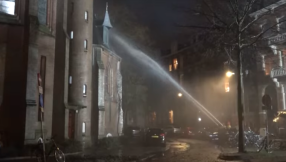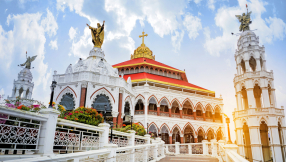It is, perhaps, ironical that the major church memorial service at St Martin-in-the-Fields marking the 25th anniversary of the racist murder of Stephen Lawrence today, falls on St George's Day.
But the twist of fate provides a chance to explore some related issues. And certainly issues around what the subsequent Macpherson report called 'institutional racism' in the police are very much still alive today, as the archbishop of York, John Sentamu, pointed out yesterday.
I vividly remember news of the unprovoked killing in Eltham and, like so many others, I became gripped by the anti-racist cause as a result (not to mention that of police racism specifically and lack of police accountability, on which I would much later write a New Statesman cover story).
And watching the superb, three-part BBC documentary Stephen Lawrence: The Murder That Changed A Nation in recent days, you cannot help but shed a tear again over the ordeal of Stephen and his parents Doreen and Neville whose courageous fight for justice against allegedly corrupt Met force officers finally resulted in the imprisonment of two of the five murderers.
But has the nation really changed, and what do we mean by nation anyway?
As the campaigning MP David Lammy told Christian Today last week in the wake of the Windrush scandal which itself tells us so much about a regressive culture in government: 'Of course [black] people are British – they are British subjects but, are they allowed also to be English? Or is Englishness confined to ethnicity and a racial definition?'
He went on: 'In a post-Brexit environment there are elements in the country who want to define being British or English as a white Anglo-Saxon background.'
I've written here before how, for these reasons, I'm among the many who consider myself British but not English, in the context of the threat of Scottish independence which would render me without an identity.
That's partly why I'm a passionate Anglo-Scottish UK Unionist, but I'm also, as I said in that article, the son of a Canadian mother who has recently described to me how upset she was when she herself fell victim to a mild form of Windrush-style harassment at the hands of the Home Office. Having come here in 1964 aged 18 under Commonwealth entitlements and without the need for a British passport, and after decades of tax-paying as a publisher, she was suddenly accosted by an immigration official at Heathrow almost 40 years later, in 2005, when returning from a book fair in Frankfurt, and told she was not entitled to return.
Eventually her passport was stamped with a two-month visa and 'no recourse to public funds', and it was only after proving that she had married a British citizen, along with multiple payments, that she was allowed to stay.
Like many immigrants, my mother may now be British but she is not English. And now, the liberal notion of Britishness is itself under unprecedented threat from the break-up of the UK and an English nation apparently turning in on itself in the face of Brexit.
There are merciful glimmers of hope. That Prince Harry, who in 2005 caused outrage when he wore a Nazi uniform to a fancy-dress party, will be attending the Stephen Lawrence memorial service at St Martin-in-the-Field church in London later today, is a welcome and rather moving sign of progress.
But twenty-five years after the brutal murder and the subsequent, catastrophic police investigation, this nation, whatever that may mean, has not really changed so much, on race, on policing or on integration.
Sorry, but Englishness has become a toxic concept and I for one won't be celebrating today.













